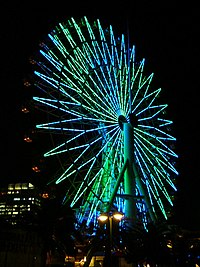Theme park
A theme park or amusement park is a place with attractions made up of rides, such as roller coasters and water rides. They usually contain a selection of different types of rides, along with shops, restaurants and other entertainment outlets. Theme parks can be enjoyed by adults, teenagers and children.

Many are themed to a particular area; there are water parks, parks modeled after toys, parks modeled after movies or types of movies, usually adventure or action.
Origin
[change | change source]The period from the 1950s through the 1970s brought about a core era for growth in the contemporary theme park industry, as a strong American middle class was being established and personal transportation became a common good.[1] The baby boom following the second World War guaranteed a large number of families seeking to spend time together, and expanding labor rights allow for more free time to do just that.[2]
Finally, long-distance travel options and new forms of transportation, such as passenger air travel, grew in importance, making new destinations accessible. This mix of ideal economic conditions, combined with innovations during the time period, formed a perfect foundation on which to build the modern theme park concept to be developed.
A similar “perfect storm” unfolded in Europe, with new innovations and attractions reshaping pleasure gardens and driving new experiences. Unique offerings were key to transporting families to worlds of imagination and wonder, but also to attracting audiences from further away.[3]
The sheer concept of theme parks was born out of a combination of three early traditions: traveling fairs, pleasure gardens, and world fair exhibits. Slowly the three came together and formed the modern amusement park, inviting all age groups.
Back in the day, the decision of going to a theme park was equivalent to an out of city trip, where people dressed the part. Men wore suits and ties, and women were always spotted in heels, as opposed to now, when people have ditched all that for comfortable clothes and sneakers. Today, enjoying amusement park rides seems like a hop, skip, and jump situation. Acrobatics, juggling acts and freak shows have gradually evolved to puppet shows and arcade games. The evolution of theme parks has been progressive – wooden roller coasters have turned into steel ones, with more safety elements added to all rides.[4]
Famous parks
[change | change source]Some famous theme parks:
- Disneyland Park, Anaheim, California, USA
- Walt Disney World Resort theme parks, Lake Buena Vista, Florida, USA
- Universal Studios Florida, Florida, USA
- Knott's Berry Farm, Buena Park, California, USA
- Six Flags Magic Mountain, Valencia, California, USA
- Legoland, Denmark, UK, USA and Germany
- Blackpool Pleasure Beach, Blackpool, Lancashire, England
- Alton Towers, Alton, Staffordshire, England
- Phantasialand, Brühl, Germany
- Gardaland, Castelnuovo del Garda, Italy
- Disneyland Park, Paris, France
- Cedar Point, Sandusky, Ohio, USA
- Fuji-Q Highland, Yamanashi, Japan
- Kings Island, Mason, Ohio, USA
- Dreampark and Wonderland, Egypt
- Efteling, Netherlands
- Warner Bros. Movie World, Gold Coast, Australia
- Warner Bros. World, Abu Dhabi, UAE
- The window of the World, Shenzhen, China
- Adlabs imagica, Maharashtra, India
- Tokyo Disneyland, Tokyo, Japan
- Tokyo Disneysea, Tokyo, Japan
References
[change | change source]- ↑ "History of Amusement Parks in America | Sonny's Place | Sommers, CT". Sonny's Place. 2020-10-16. Archived from the original on 2021-06-18. Retrieved 2021-07-10.
- ↑ Kent, Paul. "The History of Theme Park Innovation: How Bold Roots Have Grown into Remarkable Experiences". www.electrosonic.com. Retrieved 2021-07-10.
- ↑ "History and location of the main theme parks in Europe".
{{cite journal}}: Cite journal requires|journal=(help) - ↑ "Continued Innovation Drives New Possibilities in Themed Entertainment". www.mappedin.com. Archived from the original on 2021-07-10. Retrieved 2021-07-10.
